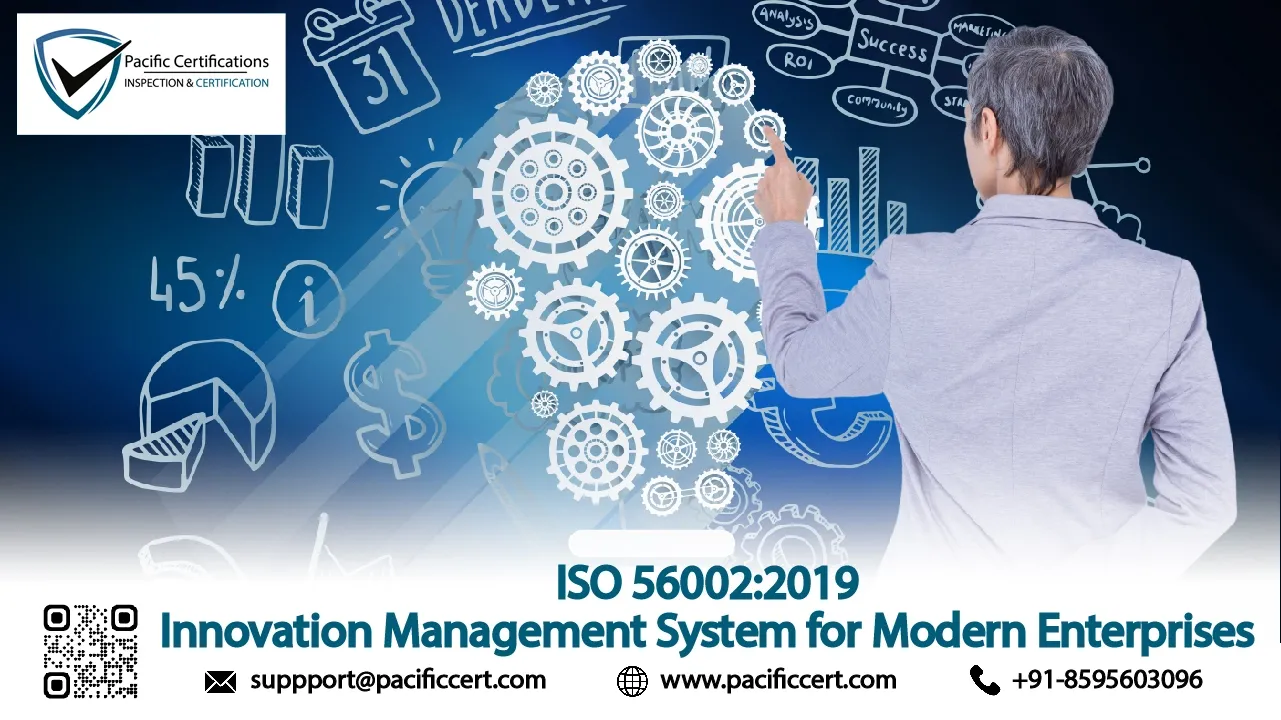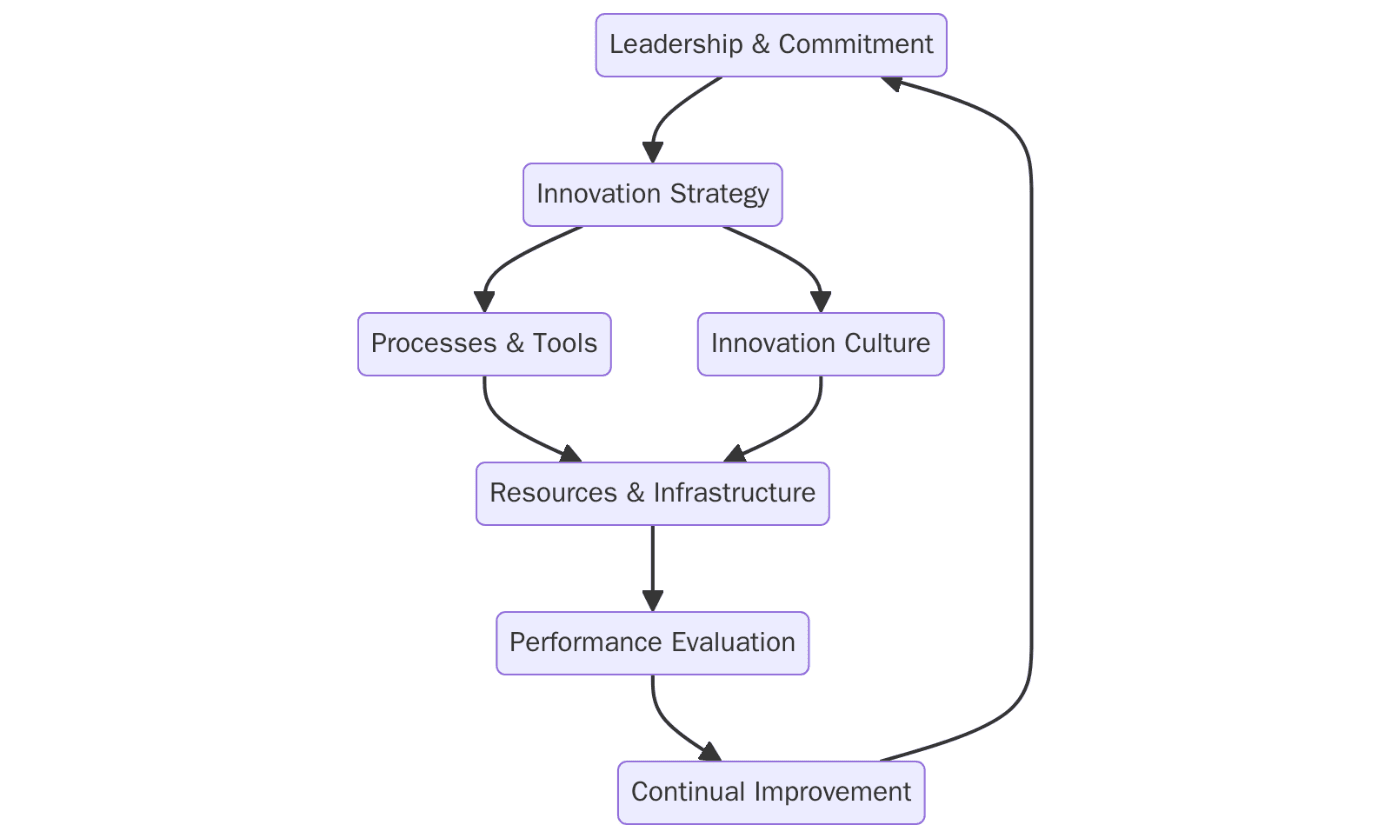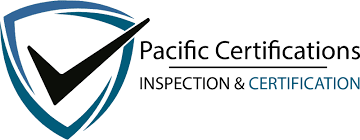ISO 56002:2019 – Innovation Management System for Modern Enterprises

Innovation is no longer a one-off project or a burst of creative energy. Institutions need a repeatable way to find ideas, test them fast, scale what works and stop what does not, all while managing risk and aligning with business goals. Venture style bets, internal product labs and cross functional squads often move in different directions unless there is a shared framework. ISO 56002:2019 provides that framework. It turns innovation into a managed system with clear intent, roles, processes and evidence so leaders can fund with confidence, teams can move faster and customers see real outcomes.
Let’s connect for a quick 15-minute call with a Pacific Certifications auditor to map out your certification path!
Quick summary
ISO 56002:2019 sets out a management system for innovation that covers strategy, opportunity insight, portfolio decisions, experimentation, partnering and value realization. Institutions use it to reduce wasted effort, shorten idea to launch cycles and track results with KPIs such as portfolio throughput, experiment success rate, time to first value and post launch adoption. The standard integrates well with ISO 9001 for quality, ISO/IEC 27001 for security and ISO 22301 for continuity, creating one operating model from discovery through delivery.
Introduction
Most teams have ideas. The real gap is turning ideas into measurable value without losing control or speed. ISO 56002 helps institutions set an innovation intent, build a pipeline from insights to scaled solutions and create feedback loops that keep learning alive. It clarifies governance, talent, partnerships and funding while keeping risk within acceptable limits. With this system in place, innovation becomes part of daily operations, not a side project or a yearly campaign.
Why ISO 56002:2019 is important?
ISO 56002:2019 matters because it makes innovation repeatable and auditable. Buyers and partners want evidence that an institution can evolve its products and services in a controlled way. Internally, leaders want visibility on where money goes and what returns are achieved. The standard provides common language for strategy, portfolio, experimentation and benefits tracking, which reduces misalignment across product, design, engineering, finance and compliance. It also helps connect innovation to customer outcomes rather than activity counts.
ISO 56002 clause wise reference table
What are the requirements for ISO 56002:2019?
To achieve alignment with ISO 56002, institutions set up an innovation management system that covers intent, process and measurement. Core requirements include:

1. Define scope and boundaries for the innovation system across products, services and functions
2. Publish an innovation intent linked to institutional goals and risk appetite
3. Conduct opportunity insights using customer research, market scans and trend analysis
4. Build a governed portfolio with criteria, gates and decision rights
5. Document processes for ideation, experimentation, incubation and scaling
6. Provide evidence records such as experiment logs, learning reports and investment decisions
7. Develop capabilities through role definitions, training and partner ecosystems
8. Implement operational controls for ethics, data protection, safety and compliance during experiments
9. Run internal audits on the innovation system and track actions
10. Hold leadership reviews on objectives, KPIs and funding allocation
11. Correct nonconformities and update the system as markets and technologies change
How to prepare for ISO 56002:2019?
Preparation aligns existing innovation activity into one system with clear evidence. Steps that help:
Run a gap analysis against ISO 56002 and map overlaps with 9001, 27001 and 22301
Draft or refresh the innovation intent and portfolio criteria with finance and risk teams
Standardize the idea to value pipeline including discovery, experiment design and scale up playbooks
Set up documentation for experiment charters, hypotheses, metrics and stop or go decisions
Implement tooling for backlog, experiment tracking, benefits realization and learning repositories
Pilot internal audits on a product line or business unit and close findings before external assessment
Define KPIs and SLAs such as experiment cycle time, approval turnaround, partner onboarding time and benefits realization lag
Certification audit
The audit confirms that the innovation system is documented and operating in practice. The flow is:
Stage 1 audit: Reviews scope, innovation intent, portfolio criteria, processes and records.
Stage 2 audit: Evaluates implementation across squads, labs and business units through sampling and interviews.
Nonconformities: Must be corrected with documented proof before approval.
Management review: Confirms leadership oversight, funding discipline and action follow through.
Final certification: Awarded once compliance gaps are resolved.
Surveillance audits: Conducted annually to verify ongoing effectiveness.
Recertification audits: Required every three years to maintain certification.
What are the benefits of ISO 56002:2019?
ISO 56002 links innovation effort to outcomes and reduces waste by creating clear gates and evidence. Institutions can track progress with KPIs and SLAs that buyers and boards understand. The main benefits include:

Clear line of sight from strategy to portfolio to launched value
Faster learning cycles through structured experimentation and decision gates
Better use of funding with visibility on bets, risks and returns
Stronger collaboration across product, design, engineering, legal and finance
Scalable partnering with startups and research bodies under common rules
Measurable outcomes via KPIs such as time to first value, adoption, churn impact and audit closure time
In recent years adoption of ISO 56002:2019 has grown as institutions look to unify product development, research partnerships and venture style investments under one model. Teams are integrating the standard with agile delivery and OKR planning so portfolio bets tie to quarterly outcomes. AI is being used to mine customer feedback and market signals for opportunity insight, while SLAs appear in partner agreements for data access, prototype turnaround and co-marketing support. Dashboards now track experiment cycle time, pass rate at each gate, benefits realization after launch and corrective action closure so leadership sees value, not just activity.
Contact us
Pacific Certifications provides accredited ISO 56002 certification services for institutions in every sector. Our audits help you align strategy, portfolio and delivery so innovation creates reliable outcomes.
Contact Us
Request your ISO audit plan and fee estimate, we will help you map Stage 1 and Stage 2 timelines and evidence requirements for your institution. Contact us at [email protected] or visit www.pacificcert.com.
Read more: Pacific Blogs

